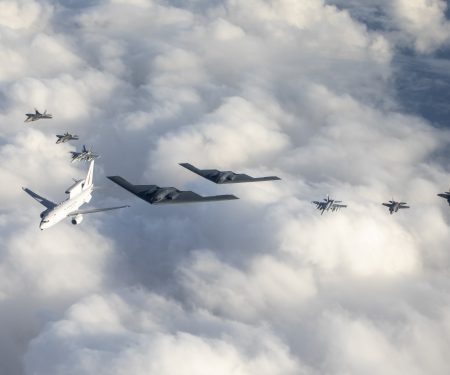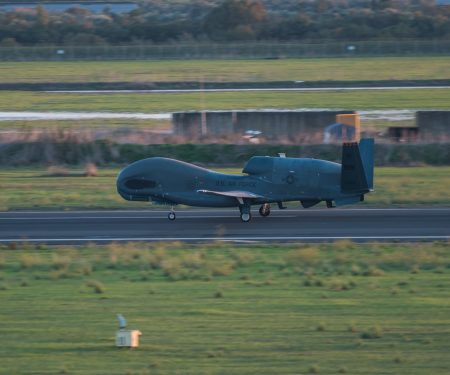In a First, USAF RQ-4 Global Hawk to Operate from UK
Allvin Takes Aim at New Area for Re-Optimization: Family Readiness
Workhorse of the Air: C-130 Celebrates 70 Years Since First Flight
Radar Sweep
Ukraine Uses Kursk Success to Press Biden on Lifting Weapons Restrictions
Ukraine’s invasion of Russia has flipped the gloomy narrative on the war, and Kyiv is using its battlefield success to launch a new pressure campaign on the U.S. to lift the last restrictions on the use of long-range weapons inside Russia.
US Hits Chinese Companies with New Sanctions over Russia-Ukraine War
The U.S. on Aug. 23 sanctioned a long list of Chinese and Russian companies over their support for Moscow’s war in Ukraine, as the Biden administration looks to sharpen its tools aimed at crippling Moscow’s war machine. The sanctions list, targeting nearly 400 entities and individuals, is among the most sweeping actions taken yet against Chinese companies for their support in the war against Ukraine.
Israel, Hezbollah Exchange Heaviest Strikes in Months, Raising Regional Tension
Israel and Hezbollah on Aug. 25 exchanged their heaviest strikes since the Gaza war began in October, with Israeli war planes bombing sites across southern Lebanon and Hezbollah firing a barrage of drones and rockets across the border—a dramatic but contained escalation that stopped short of all-out war. Israel said it launched a preemptive strike on “thousands” of Hezbollah rocket and missile systems that were poised to take part in a major attack on Israeli targets.
OPINION: When It Comes to Military AI, There Is No Second Place
“When future military capabilities are discussed these days, artificial intelligence and how it will change the nature of warfare is at the top of the list. But within the Pentagon and the services, AI ambition does not match current budgetary realities,” writes retired Adm. Gary Roughead, who served as the 29th Chief of Naval Operations from 2007 to 2011.
US Military Kills a Leader of an al-Qaeda-Linked Group in Syria
U.S. forces successfully killed a leader of a Syrian terrorist organization early Aug. 23. Abu-’Abd al-Rahman al-Makki, part of the governing council for Hurras al-Din, was killed in a targeted strike, U.S. Central Command shared on Aug. 23.
PODCAST: Want to Fight and Win? Air and Space Integration Is Key
In episode 198 of the Aerospace Advantage, Heather Penney chats with Robert Lightfoot, president of Lockheed Martin Space; Greg Ulmer, president of Lockheed Martin Aeronautics, and Mitchell Institute’s Charles Galbreath. We now live in a world where mission effects will best be assured by pursuing a combined air-space approach. This will demand a new strategy to ensure smart multi-domain collaboration, a new assessment regarding how smart command and control is executed to ensure smart tasking, and adequate resourcing. Join us to hear from some of the top figures in this discussion who innovate the technologies that are key to delivering mission results today and tomorrow.
Taiwan Boosts Defense Spending in Face of Chinese Military Prodding
Taiwan’s Cabinet, the Executive Yuan, this week ratified a record defense budget of NT$647 billion, or US$20.2 billion, meant to help defend Taiwan against the prospect of a Chinese invasion. The spending decision comes as Chinese forces continue their prodding of the island, which Beijing views as a rogue province. As of Aug. 22, People’s Liberation Army intrusions into Taiwan’s air defense identification zone—1,739 incidents in 2024—had already reached an annual record.
How Do You Change a Command’s Culture? This General Tried Being Direct About War with China.
Gen. Mike Minihan needed people to listen. In 2021, fresh off his previous role as deputy commander of U.S. Indo-Pacific Command, Minihan knew that a massive overhaul of the world order was potentially underway. Air Mobility Command, his new post, needed to prepare to beat China.
Northrop Grumman Awarded $200M Deal for Deep-Space Radar That Will Be Hosted in Wales
The Space Force has awarded Northrop Grumman a $200 million contract to build its second Deep-space Advanced Radar Capability (DARC) that will be stationed in the United Kingdom, the Defense Department announced Aug. 23.
Special Operations Forces ‘Big Fan’ of Replicator, Especially for Pacific Missions
U.S. special operations forces are already a “big fan” of the Pentagon’s Replicator drone project, especially as the DOD imagines what a fight in the Pacific could look like, according to a senior official. “First off, I think … it’ll field systems much more quickly than the standard defense industrial base process, procurement process,” Chris Maier, assistant secretary of defense for Special Operations and Low-Intensity Conflict, told the Defense Writers Group.
SpaceWERX Awards Contracts to Nine Space Tech Firms for Defense Projects
Nine space technology companies won a new round of contracts from SpaceWERX, a Los Angeles-based organization that connects military needs with commercial space technologies, officials announced Aug. 22. The contracts, known as Strategic Funding Increase (STRATFI) agreements, are funded by the Department of the Air Force’s AFWERX organization.
VIDEO: ‘Lie to Fly’
Minutes before boarding an Alaska Airlines flight home in 2023, Joseph Emerson, a pilot, sent a text to his wife, eager to reunite with their two young children and longing to be by her side. The flight was full, and Emerson, who was off duty, took the cockpit jump seat. What should have been a routine trip quickly turned dramatic and dangerous. During the two-hour journey from Everett, Wash., to San Francisco, Emerson reached up and pulled the plane’s two fire-suppression handles, designed to cut the fuel supply and shut down both engines. Two days earlier, Emerson had consumed psychedelic mushrooms. He had long harbored fears that seeking mental health treatment could jeopardize his career.




